From a production standpoint, the Nashville Predators have the league’s best defense, with 93 points by eight players. None of their blueliners exhibits this offensive ability more than captain Roman Josi, who consistently puts up great numbers and is currently second on the team in points. However, he is also somewhat of a polarizing defenseman as people’s opinions of him tend to be on opposite ends of the spectrum.
There are many reasons to like him. He can skate, lead a rush and stick handle as well as many of the league’s forwards. He has a great shot, possesses good vision and is confident in his abilities. He is signed to a team-friendly deal, is beloved by fans and was voted captain by his teammates ahead of the 2017-18 season.
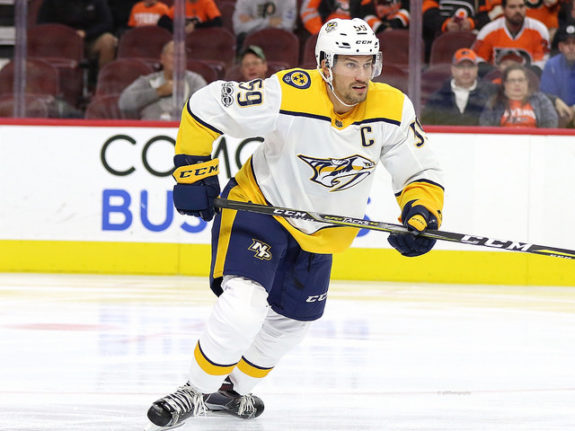
However, there are also questionable aspects to his game. His offensive abilities can put teammates in comprising positions with how aggressively he pinches in the offensive zone. These pinches often lead to two-on-one opportunities for the opposition and force Predators forwards to play out of position to cover up for him.
Even his deal, which while team-friendly, expires after the 2019-20 season and his cap hit will go up by a substantial amount on his next contract. That means his next deal is much less likely to be team-friendly. It’s for those reasons that I think there is justification in GM David Poile looking to trade Josi.
Reasons to Not Trade Josi
Before getting into why the Predators should trade their captain, I want to look at why they shouldn’t part with him. For starters, he is an elite offensive defenseman and there are few blueliners in the league who can match his production. In 516 career regular season games, he has 85 goals and 318 points. Among defensemen in franchise history, both totals rank second behind Shea Weber, although Josi has a higher points-per-game average.
He has totaled 50 or more points in three of the past four seasons and has 10-plus goals in each of the past five and is on-pace to surpass those marks again this season. He led the Predators’ blue line in scoring three straight seasons between 2014-15 and 2016-17 and is leading the position again this season. He also finished in the top-10 in points among NHL defensemen each of those seasons. So far in 2018-19, he has registered at least one point in 20 of his 35 games.
Another reason to not deal the Swiss defenseman is his lengthy track record of health. He has never missed more than 10 games in a season since he became a full-time player in 2012-13 and has appeared in every Predators game this season. Even when he has missed time, his absences have often been short stints due to upper or lower-body injuries rather than the effects of long-term ailments that require surgery.
Another reason to not trade him is that he’s the team’s captain, although it hasn’t stopped Poile in the past. It’s something he’s done multiple times: he traded Tom Fitzgerald, the team’s first captain, to the Colorado Avalanche in 2002, he flipped Kimmo Timmonen to the Philadelphia Flyers in 2007, he dealt Jason Arnott to the New Jersey Devils in 2010, and finally, in 2016, he acquired P.K. Subban from the Montreal Canadiens in a one-for-one trade for Shea Weber.
Lastly, there’s Josi’s contract, a seven-year, $28 million deal he signed in 2013, which has underpaid him from the start given his production. The fact that he has no trade protection makes the contract all the more valuable. However, his $4 million cap hit will expire after the 2019-20 season, so while his contract is a reason to keep him, it’s also a reason to deal him.
Josi Due a Raise on Next Contract
When his current contract expires, Josi will be 30 years old and will likely be leaving or have already left his prime. He signed his current contract when he was 23 and had just finished his entry-level contract (ELC). Because he will be in his 30’s, it’s reasonable to think that his next contract will be his last opportunity to sign a long-term, lucrative deal and, because he’ll be looking to compensate for not being paid fair value on his current deal, his new contract could be one to avoid.
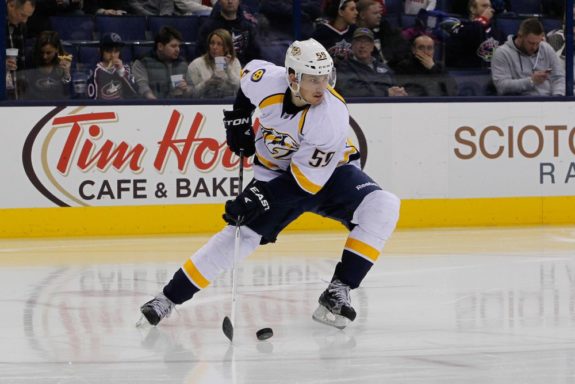
Speculating on what he could ask for on his next contract starts with reviewing comparable defensemen by using Hockey-Reference’s Similarity Scores. Some of these include Victor Hedman, Kevin Shattenkirk, Oliver Ekman-Larsson, and John Carlson. From age 22, when Josi became a full-time player, through his age-27 season, he accumulated 73 goals and 276 points.
By comparison, Shattenkirk had 55 goals and 242 points, Carlson had 54 goals and 222 points and Hedman had 70 goals and 295 points. Ekman-Larsson, who turns 28 in July, has 88 goals and 240 points. So Josi produced more than Shattenkirk and Carlson, and is likely to produce more than Ekman-Larsson, at the same ages. Now, let’s look at the players’ contract histories, which is where things get interesting.
Following his ELC, Hedman agreed to a five-year, $20 million contract which expired after the 2016-17 season. His current contract is an eight-year deal that carries a $7.875 million cap hit with a no-movement clause (NMC) attached to it. He agreed to the contract before he won his Norris Trophy, so he’s worth more than his cap hit. Shattenkirk played on a four-year deal with a $4.25 million cap hit after his ELC. As a free agent in 2017, he signed with the New York Rangers, agreeing to a four-year contract with a $6.65 million cap hit and a NMC.
Ekman-Larsson is in the last year of a six-year, $33 million contract that he signed before his ELC expired. He agreed to an eight-year extension on July 1, 2018 and his cap hit will increase to $8.25 million. He too has a NMC attached to his deal. Then there is Carlson, in the first year of the eight-year, $64 million extension he signed in June. The contract has a modified no-trade clause included. His previous contract, which went into effect after his ELC expired, was for six years and had a cap hit of $3,966,667. He hit the open market at the perfect time after he had career highs in goals and points last season and followed it up with a stellar postseason.
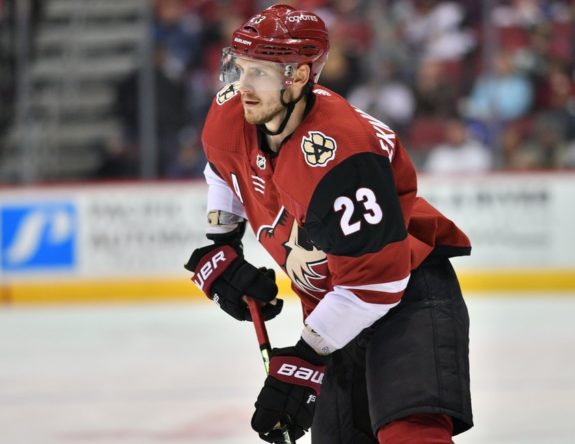
So what do those comparables mean for Josi? He produced more than all but Hedman through age 27 so there’s an argument to be made that he should receive a higher cap hit than all of those players. Whether that happens or not will be interesting. He is already worth at least $8 million per season, not including the salary cap increase that is likely to occur between now and when he reaches free agency.
It’s easy to see him being paid more than the $9 million cap hit teammate P.K. Subban has. Both are great offensive producers, although Subban is a stronger defender. When Subban signed his current deal, the cap hit represented 13 percent of the salary cap at the time. Using the current upper salary cap limit of $79.5 million, 13 percent equates to a $10.3 million cap hit, a reasonable number for Josi. That is a substantial raise, and I’m uncertain if Poile and the Predators will be willing to go that high, even if the player is worth it.
Departure Could Alleviate Expansion Draft Pressures
As they are currently constructed, the Predators are in one of the worst positions when it comes to protecting key assets in the Seattle Expansion Draft. If they protect seven forwards and three defensemen, they are all but guaranteed to lose one of their top-four blueliners. If they go the eight skaters model, it would likely result in losing one of Kevin Fiala, Calle Järnkrok or Ryan Hartman. But, if they trade one of their defensemen, this problem is made easier.
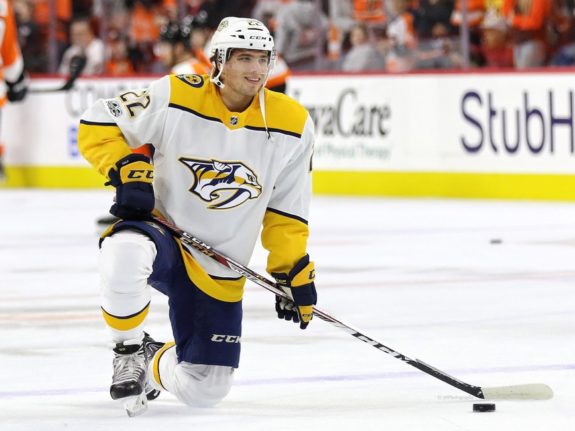
If they were to trade Josi, it would allow them to only have to protect three defensemen without fear of losing one of their core pieces. That would then allow them to protect seven forwards, more than enough slots to ensure that all of their key producers remain on the roster. It’s a small benefit from trading Josi, but still an impactful one.
Related: What Does Expansion Mean for the Predators?
Trading Him Would Address Other Needs
The biggest benefit to parting with Josi would be that the team could address areas of need with the assets they acquire in return. The Predators may be the league’s best defensive team in terms of goals allowed, but they are tied for 11th in offense and for 13th with four players with 20 or more points.
However, their two forwards with that many points are tied for 27th and only the Arizona Coyotes, Carolina Hurricanes and Los Angeles Kings have that few or fewer such players. The Predators’ two players with 10-plus goals tie for 23rd, yet their four defensemen with at least 10 points are tied for second, behind only the Tampa Bay Lightning’s five.
Their power play has been abysmal at 15.3 percent, 26th in the league, and they are 22nd in power play goals. The team’s 14 games with at least one tally on the man advantage are tied for 20th and their four games with multiple power play goals are tied for 14th. Finally, their four players with at least two goals on the man advantage tie for 22nd.
So what’s to blame for these offensive struggles? For one, injuries. Losing Viktor Arvidsson, Filip Forsberg, and Subban for an extended period of time naturally leads to regression, but it’s not the only factor. Having the league’s most productive blue line has its benefits, yet also its drawbacks, including its predictability.
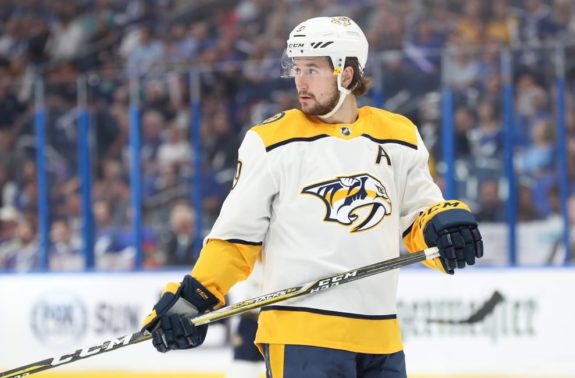
When on the power play, the Predators generally deploy three forwards and two defensemen while most teams go with four forwards and one defenseman and some have experimented with five forwards. Why are power plays often forward-heavy? For starters, it’s because forwards are typically faster and better skaters and possess the ability to make passes and shots that most defensemen can’t. Forwards are also accustomed to playing down low in the offensive zone and generating scoring chances from that area of the ice.
But there’s also a level of predictability when using two defensemen. Using the Predators as an example, the power play goes through their blueliners. When Ryan Ellis and Josi are deployed, the latter generally acts as a distributor while Ellis is the trigger man, looking to exploit open shooting lanes. The same applies when Mattias Ekholm and Subban are on the ice with Subban as the shooter.
The problem with this setup is that it typically doesn’t take the opposition long to figure out the Predators’ plan, and disciplined penalty killers have had success shutting down their power play. As the league progresses and analytics become more prevalent, it’s becoming clearer that using two defensemen on the power play, except when defending a lead, isn’t a path to long-term success.
Potential Trade Partners
So if the Predators were to trade Josi, what would they look for in return and what teams could be suitable trade partners? They have few holes on the roster. Even without Josi, they’d have a stingy defense, their goaltending would be strong, now and in the future, and their offensive depth would still be present. The one area they are lacking in is a top-tier sniper who is a threat to score timely goals from anywhere in the offensive zone.
That lethal goal scorer is the kind of player who helps win in the postseason and one of the reasons they lost to the Pittsburgh Penguins in the 2017 Stanley Cup Final is because they lacked such a player. Forsberg and Arvidsson are great contributors, but they aren’t Alex Ovechkin, Patrik Laine, or Nikita Kucherov.
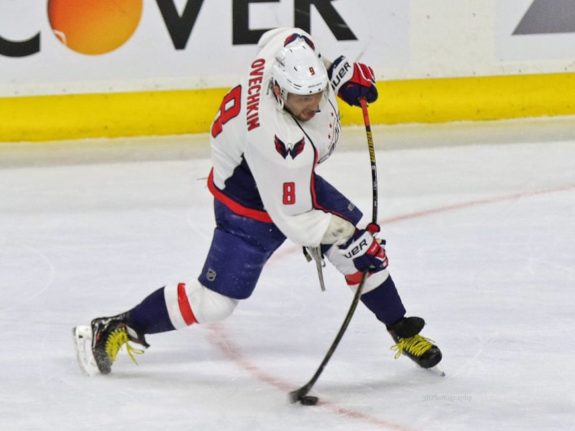
This absence also isn’t new for the franchise. They’ve never had a player score 35 goals in a season and their lone 80-point producer was Paul Kariya during the 2005-06 season. The last time they had a player finish a season with at least 70 points was in 2007-08 when J.P. Dumont and Arnott did so. Recent history has proven that it is difficult to win Stanley Cups without high-end talent like the Washington Capitals, Chicago Blackhawks, and Penguins have and it’s my feeling that trading Josi could address that need for the Predators.
Trying to determine what the team could ask for in a trade is difficult because there haven’t been many trades involving number one defensemen in recent history, especially when the return is a top-six scorer. A comparable trade that did occur was the Predators’ acquisition of Ryan Johansen from the Columbus Blue Jackets in exchange for Seth Jones. The Predators needed a top center and Jones had top-pair potential, which he has since proven true.
Another trade was when the Buffalo Sabres dealt Tyler Myers, Drew Stafford, Joel Armia, Brendan Lemieux, and a pick that became Jack Roslovic to the Winnipeg Jets for Evander Kane and Zach Bogosian. In 2011, the San Jose Sharks acquired Brent Burns from the Minnesota Wild and gave up Devin Setoguchi, Charlie Coyle, and a first round pick in return. Lastly, and moving a little further back, in 2006, Chris Pronger was traded to the Anaheim Ducks from the Edmonton Oilers for Joffrey Lupul, Ladislav Smid, and picks that became Jordan Eberle and Travis Hamonic.
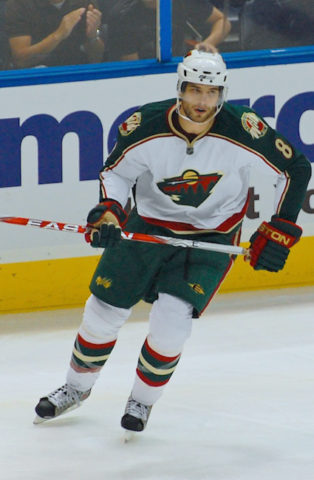
While none of the trades are the exact equivalent of a potential Josi trade, they are all in the ballpark, particularly the Burns’ trade. At the time, he had just come off a season similar to a typical Josi season with 46 points. The Wild landed Setoguchi, a former 30-goal scorer and Coyle, a middle-six forward.
Also interesting is the Pronger deal, which is not to say that Josi is a future hall of famer. But at the time, Pronger had been putting up seasons that were in line with what Josi has compiled in recent campaigns. The Oilers yielded quite a bit: Lupul scored 28 goals and 53 points the previous season and Eberle and Hamonic have had solid NHL careers.
Back to the present, what teams would be looking for a top-pair, left-shot defenseman on an expiring contract while also willing to part with a top-six forward? I believe I’ve found a few. For starters, the Toronto Maple Leafs, a team in need of defense help. They have plenty of offensive firepower up front that could make the trade happen. Would they be willing to part with newly-signed William Nylander? Or what about Kasperi Kapanen and a young defenseman in return?
There’s also the rebuilding Ottawa Senators with impending free agents Mark Stone and Matt Duchene. It’d be ironic if the Predators acquired Duchene, a player they were linked to before acquiring Kyle Turris last November in a three-way trade between the Predators, Senators, and Avalanche.
The Penguins are also rumored to be looking for defense help; would they part with Jake Guentzel to make a deal happen? Lastly, the Vegas Golden Knights, off to a slower start in 2018-19 after they reached the Stanley Cup Final last season with a patchwork blue line. Imagine how strong of a team they’d be with a true number one defenseman like Josi. In return, the Predators could ask for Alex Tuch with 25 points in 28 games this season as a 22-year-old.
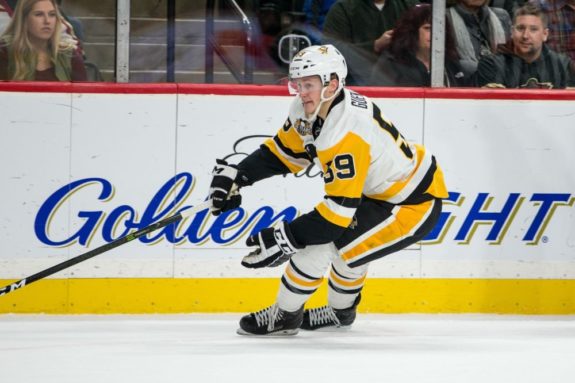
Will it Happen?
It’s hard to tell if Poile and the Predators would realistically considering parting with Josi. With Poile’s track record of making moves and even trading fan favorites, I feel confident that no players are off-limits. Josi is an excellent defenseman and is one of the team’s best players.
However, they have needs elsewhere on the roster, specifically someone who can be a trusted scorer for them, and unless they want to trade Eeli Tolvanen or Dante Fabbro, further weakening their farm system, it’s going to require moving a roster player to make such a deal possible. Losing Josi would be tough, both for the team and the fanbase, but it may be what’s necessary for the Predators to win a Stanley Cup.
*All stats came from Hockey-Reference